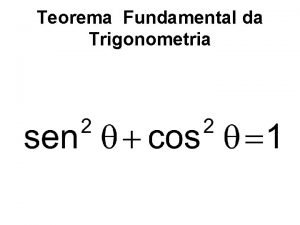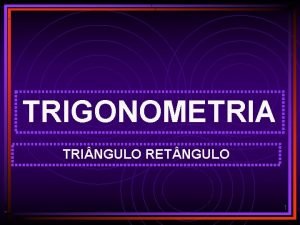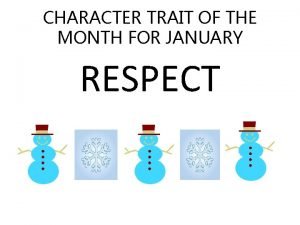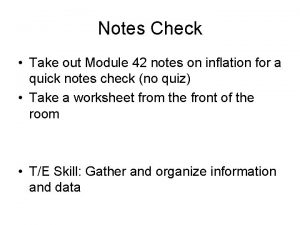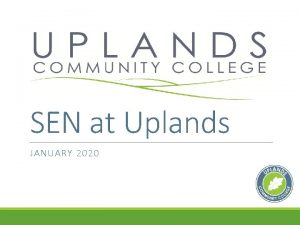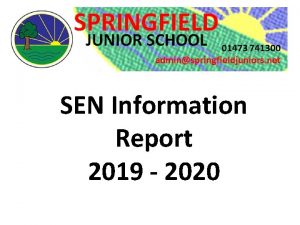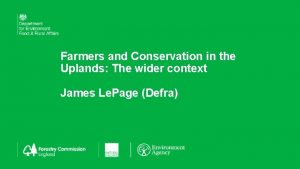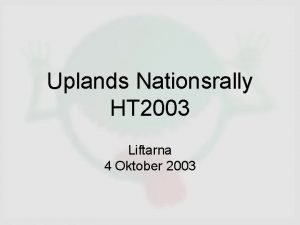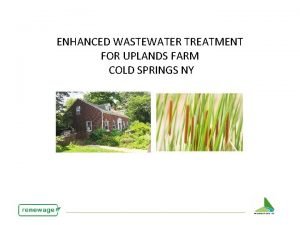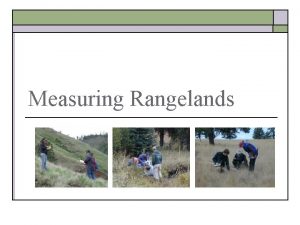SEN at Uplands JANUARY 2020 How are SEN









- Slides: 9

SEN at Uplands JANUARY 2020

How are SEN identified? • Information from primary or previous school (records & visits) • All Yr 7 students are screened on entry to Uplands (word reading & comprehension & spelling) • Teacher/Head of Year referral

SEN Support • Information only • SEN Support (K) – Pupil Passport & some will have an Additional Needs Plan (ANP) • Education Health & Care Plan (EHCP)

How is this information communicated to teaching staff? §Briefing in September §SEN register – shared documents & all linked to SIMS/Edulink §Weekly staff briefings §Regular updates via email or staff meetings when necessary

Quality First Teaching The Teacher’s Standards 2012: it is every teacher’s responsibility to “adapt teaching to respond to the strengths and needs of all pupils” SEN Code of Practice 2014: “teachers are responsible and accountable for the progress and development of the pupils in their class, even where pupils access support from teaching assistants or specialist staff”

What does this support look like? Intervention Purpose Accelerated literacy, Improve literacy skills & reading & spelling KS 3 & reading. Develop SPAG. 4 Cool connections Sensory circuits Nurture group Small group & am tutor time Maths KS 3 & 4 Lunch & break support Boost confidence, improve self-esteem. Provide skills for resolving friendship conflict. Sensory motor skills programme Programme Differentiated resources. Appropriate reading books. Continues throughout the year. 6 x 1 hr sessions (weekly). Students taught social communication skills. No’s & Cost Approx 10 in each Yr gp HLTA for 1 hr fortnight Progress Measure Lucid exact (reading and spelling average scores) Approx 6 in each group HLTA for 1 hr weekly Student voice. Leuven scale. 4 am tutor times weekly. Approx 6 students TA for 20 mins 4 x weekly To encourage a positive Personal independent Approx 10 in each group classroom environment. time, project work, turn – 1 group in Yr 7 & 1 in To improve the taking and sharing Yr 8 psychological well-being activities. 1 HLTA & I TA 4 hrs a of students week Consolidation & reinforcement of Maths techniques. Boost confidence. Provide a safe environment. Communication & interaction skills development. Pastoral support. Practising questions, exam technique, breaking down questions into steps Open room for KS 3 & 4 students Approx 6 in each group HLTA TA 40 mins a day Student voice Pre & post observation of skills Pre & post communication & interaction scales and emotional & behavioural scales. Student voice. Assessment data, baseline tests, post intervention tests. Student & staff voice.

What does this support look like? Homework club Support students with homework 2 lunch times a week TA 2 x 40 mins a week Fewer detentions/comments about missed homework Curriculum support KS 4 Support KS 4 students with core curriculum. Replaces 1 curriculum subject. Differentiated resources HLTA 5 x 1 hr fortnight Assessment data. Teacher feedback. GCSE results data. KS 4 & 5 support with anxiety programme Support students who are anxious. Improve selfesteem. Develop understanding of self. Variety of resources to help Teacher (LVA) 1 hr weekly understand anxieties & Approx 8 students develop self-help strategies. Pre & post assessment questionnaires. Student voice. CLASS (Communication, Learning and Autism Support Service) Support for students with autism Anxiety around exams. Understanding autism. 1 to 1. Referral made to ES CLASS Pre & post student voice. Sixth form readers for KS 3 students To boost confidence with reading Appropriate reading books 20 mins 1 x fortnight PAT reading dog To boost confidence with reading Appropriate reading books 2 -3 students 20 mins weekly SALT Selective Mutism Encourage communication Individual programme to support communication 1 to 1 sessions dependent on programme Use of communication PAT volunteer To boost confidence. To help calm students. Talking therapy. 1 to 1 Student voice School counsellor

How can students be supported at home? §In small groups discuss how as a parent you could support your child at home?

The Learning Support Team Julie Nicholls – SENCO Gail Hayes-Fisher – HLTA / Specialist Assessor Jackie Gibb – HLTA Maths Specialist Jackie Powell – HLTA Communication and Language Claire Ashton Cobb - INA (Louis Hazells) Louise Clements – INA (Noah Sims) Isobel Lobo - TA Simon Hayes Fisher – TA Karine Kendon – TA Janet Lennox – PA to Learning Support Faculty




